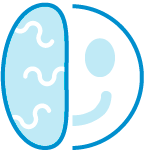
This paper focuses on the psychological analysis of the personality of an outstanding and accomplished author Franz Kafka. For better understanding of the writers individuality, this work includes his biography that contains key facts and events important from the psychological point of view. It also examines the works of three famous psychologists Dostoevsky and Parricide by Sigmund Freud, The Integration of the Personality by Carl Gustav Jung, and The Theory of Psychosocial Development by Erik Erikson. Each of these works is meticulously processed and explicated, defining the peculiarities of the development of people according to different crucial factors that can influence the way of their lifestyle. The analysis of Franz Kafkas personality in the paper is based on the application of all three theories to the writer, providing concrete examples from his biography. The paper also includes the comparison and contrast of the main conception of these theories.
Franz Kafka is one of the most outstanding and accomplished writers of the 20th century. His enigmatic works are of the utmost importance in the sphere of literature. His personality remains a great mystery that a number of legendary psychologists have tried to solve.
Franz Kafka was born on July 3, 1883 in a Prague, the capital of Bohemia (the Czech Republic now). The Kafkas was a German-speaking Jewish family that belonged to the middle class. His father Hermann set up a small successful enterprise of retailing womens and mens accessories and fancy goods, and his business had up to 15 employees. Julie, Kafkas mother, was a highly educated woman from a rich family. Spouses were heavily involved in their business, so they were unable to raise their children properly and give them needed attention. That is why a number of governesses and domestic servants brought up little Franz Kafka and his siblings (Franz Kafka biography, 2016).
AI-content Free
One of the most important phenomena in the writers life was his father who had played a crucial role in the formation of his sons personality. In Franzs dairies, Hermann Kafka was described as an extremely cruel and overbearing person, almost a tyrant. The lack of attention and love of the mother during the childhood and the total control and pressure of the father had made a profound and deteriorating impact on the further life and writing career of Kafka.
After getting an education in secondary school, Franz continued his studying at Altstadter Gymnasium, a classic-oriented state establishment. This period had an important meaning for the future choice of profession and Kafka himself. Being forced by his father to study chemistry, Franz remonstrated with such a decision and started to attend the course of Germanic philology. Such an impudent behavior could not be left in peace, and after arguments with parents, with his father accurately, Franz gave in and agreed on a compromise to study law (Felisati & Sperati, 2005).
During his students years at the Prague University of Karl Ferdinand, not only had Franz gained his Bachelors degree in Law but he also met a person who became a close and lifelong friend, Max Brod. He had always supported Franz, shared his interests, and even tried to fight his complexes (EB, 2015). On June 18, 1906, Franz received his Doctor of Law degree, and since then, he started his career in this sphere. He worked hard for a number of various companies with an exhaustive schedule in order to pay the bills and earn his living. Nevertheless, it was far from his dream job and, in the meantime, he was actively involved in creating new masterpieces, Franz made a promising career of an insurance officer. Moreover, at his work, he was considered a hard-working and efficient worker, an easy-going and sociable person, and these facts seemed to contradict the unfortunates in his private life. His first true love was Felice Bauer, whom Franz had met at Max Brods home. Franz and Felice constantly corresponded, as they had no possibility to meet each other on a regular basis (The Editors of Encyclop?dia Britannica, 2015). They were engaged for two times, but because of a number of reasons, their relationship ended in 1917.
Don’t Worry We’ll Help You Out
In addition to being in a poor condition because of the clinical depression, constant insomnia, and stresses, Franz fell sick with tuberculosis, which made him quit his job in 1922 (The Editors of Encyclop?dia Britannica, 2015). Next year, he met his new love, Dora Diamant, with whom he left for Berlin to escape the domineering influence of the family. Nevertheless, soon, they returned to Prague, and his condition debilitated. Kafka died in 1924 in a sanatorium, where he had tried to overcome his tuberculosis. He was buried in Prague beside his parents in New Jewish Cemetery (EB, 2015).
This research paper views such three theorists and their works as Sigmund Freud and Dostoevsky and Parricide by Sigmund Freud, Carl Gustav Jung and his The Integration of the Personality, and The Theory of Psychosocial Development by Erik Erikson.
The choice of the article Dostoevsky and Parricide is not accidental: one can easily find the similarities between the personalities of two outstanding writers Dostoevsky and Kafka. In his work, Sigmund Freud makes the psychoanalysis of a famous Russian writer, studying his personality from different aspects and the phenomenon of parricide, differentiating hysteron-epilepsy and the nature of Dostoevskys attacks of disease. In Freuds opinion (Rancour-Laferriere, 1989), a moralist is a person that feels a strong temptation inside but is able to resist it successfully. Belonging to such a kind of people, the author usually wrote about murders, criminals. The confession of the intention to kill a father, which is the main aim in psychoanalysis, is considered impermissible without special analytical preparation, and this fact makes the writers veil their plots. Such a contradiction in Dostoevskys personality can be explained by a strong destructive propensity directed at himself because of the lack of love or emotional-appreciating attitude, and these aspects developed his feeling of guiltiness, masochism, and sadistic traits of character. It is given that the attitude of a boy to his father is ambivalent as a son loves and detests him at the same time. These two different feelings combine and cause the identification with the father, the excitement of his personality, and the desire of discharging and substituting him. This phenomenon is also known as Oedipus complex.
Original writing according to your instructions
Deadlines from 3 hours to 60 days
All disciplines covered
Confidentiality
24/7 Support
Plagiarism-free papers
Timely delivery
Skilled writers with Master’s/PhD degrees
Personal data security
Instant replies to all your questions
In his work, Carl Jung tries to examine the expediency of bringing up a child as personality since all great actions are made by personality not the mass (Adler, 2014). It a known fact that unhappy childhood can inflict lifelong wounds and influence somebody greatly. The main rule for most parents, who are usually quite incompetent, if they want to bring the child up, they must be brought up well themselves. It is impossible to correct in children those things that the adults cannot correct in their past. Thus, it is easier and more logical to change themselves. Nevertheless, a well-educated person is not always a well-brought up one. People should consider themselves personalities; otherwise, they will become doubtful, diffident, and unable to fight for their existing. Therefore, high ideals of personality should not be applied to children because it can only come with age, or a person will remain a big child. Personality is not an embryo in a child, as it cannot develop without definiteness, integrity, and ripening. That is why Jung tries to accentuate again parents should not be fanatic and obtrude the ambitions they could not realize by their own. In Jungs opinion, personality is the highest realization of inborn originality in a separate human being (Adler, 2014). It is a way to bring up children but not the aim, since it leads to loneliness. The psychologist also mentions that neurosis is a highly paid attempt not to listen to the inner voice. Therefore, the formation of personality is a risk.
Free Features
Cover/
Title Page
References/
Bibliography List
Table of Contents
Abstract
Outline
(on demand)
According to Eriksons (1993) theory of psychosocial development, there are eight stages of a human life, and each of them is characterized by its own conflict and new traits of character. Moreover, the difference in the methods of upbringing a child involves the essential changes in the formation of personality: 1) Trust vs. Mistrust (birth 1 year) the formation of the basis of sane personality, including the development of trust, confidence, certainty; the embryo of Ego. The second stage is Autonomy vs. Shame and Doubt (1 3 years) the identification of a child as I am what I can do alone, the formation of self-dependent skills, will, and self-control. The third stage is Initiative vs. Guilt (3 6 years) I am what I will be, the formation of Super-Ego as the result of accepting social bans, the ability to solve new problems and to contact with others. The fourth stage is Industry vs. Inferiority (6 12 years) I am what I have learned, the willingness to leave a family for the first time in order to learn new things, the concept of perfect performance. The fifth stage includes Identity vs. Confusion (12 20 years) Who am I?, the formation of the positive aspect of Ego as the dominant one, the main stage in the phenomenon of the psychological and social prosperity. The sixths stage Intimacy vs. Isolation (20 25 years) is the period of getting a profession, the beginning of love relationships, independent domesticity; love is considered the solution to the main conflict. The seventh stage is Generativity vs. Stagnation (26 64 years) the conflict can result two phenomena: the care about natives as a positive aspect, and the care about ones comfort and needs. Finally, Integrity vs. Despair (65 death) the integration of Ego is based on the satisfaction with the course of life, what influences the attitude to death, the necessity of adapting to the new condition and needs.


Exclusive savings! Save 25% on your ORDER
15% OFF your FIRST ORDER (with the code toppapers15) + 10% OFF every order by receiving 300 words/page instead of 275 words/page
It is believed that Franz Kafkas father played an important role in the formation of his personality. According to Freuds work (Rancour-Laferriere, 1989), the attitude of a son to his father is always ambivalent, and one can easily find the projection of this theory in Kafkas life. It is evident that Franz loved his parents, his family. At the same time, he wrote in his diaries that his fear was his substance (Felisati & Sperati, 2005). Analyzing the plots of his works, one can find a constant conflict between a father and a son. What is more, in The Metamorphosis and Judgment antagonists go further: they oppose their fathers and, eventually, die. Therefore, that basic fear was the fear of the father who was a very cruel and overbearing person. As for Franzs mother, she worked up to 12 hours together with her husband who was her business partner. The lack of her attention and love caused the formation of Oedipus complex. Willing to receive mothers affection, little Kafka wanted to substitute the hateful person with whom she spent most of the time, so he subconsciously identified himself with his father. Such an identification made Franz the main rival in the emulation for the mothers love and it would undoubtedly meet the punishment from the father emasculation. Actually, that could easily become the main factor of Kafkas fear of the parent. This fear played a crucial role in the formation of Kafkas personality because emasculation as a punishment or the price of mothers love was so horrifying that it rendered the hate of his father impossible. As the matter of fact, the overbearing father influenced Franz Kafka in such a way that he had lifelong problems in the sexual sphere. At the subconscious level, such an identification caused the formation of a new phenomenon in his ego called super-ego. If the father is cruel and strict, as in this case, then super-ego gets such traits of character and becomes sadistic, and ego takes a feminine-passive part in these relationships and become masochistic, having a permanent need in the violent acting of super-ego. Since normally a person is punished for doing something wrong or bad, the constant need of cruel attitude causes the obsessive feeling of guiltiness. Moreover, such a destructive acting on himself made Kafka become an extremely diffident, suffering, and unhappy person.
Book The Best Top Expert at Top-papers.com
Your order will be assigned to the most experienced writer in the relevant discipline. The highly demanded expert, one of our top-10 writers with the highest rate among the customers
Hire a TOP Writer for 4.40 USD


Considering Jungs theory, it also can be easily applied to Franz Kafka (Adler, 2014). The biography of the writer unveils a number of facts about his upbringing. Franz was the first child, and obviously, his parents were incompetent in the methods of raising their son. Moreover, they did not have enough time for that because of their full employment. That is why a number of governesses and servants brought up Franz together with all of his siblings. Such a decision of the spouses could be considered positive only in that case if those people had been specially handpicked as well brought up by themselves because well-educated was not always well brought up (Adler, 2014). Still, one should mention the well-known image of the father in Kafkas formation of personality. That was Hermann who had always insisted on Franz getting profound education, particularly in the sphere of law but who was far from being well-educated himself. That is probably nothing but the attempt to thrust his unrealized ambitions on his son and correct his own mistakes. Therefore, getting the Doctors degree of Law, Kafka had doubts about finding his own place in the social stratification and in the world globally, which caused the feeling of diffidence and ruined the belief in himself.
The Eriksons theory of psychosocial development is the last one that is applied to Kafkas personality and that can be used to analyze him through the main stages (Erikson, 1993). At first stages the absence of the mother, the nearest person usually associated with security and confidence, caused the first problems with Kafkas believing people. With the beginning with the second stage, it is impossible not to notice the impact of the father. High expectations from Franz, which were almost impossible to fulfill, in the combination with the restriction of his activities promoted the feeling of shame, doubt, weak will, and humility, which influenced the ability to socialize with peers at the fourth stage. What is more, the limitation in the choice of profession (the father was against the studying of German philology) created problems with self-identification (the fifth stage). The next two stages of Franzs development were the result of preceded ones: the social isolation as the matter of distrust rendered any relationships or the creation of own family impossible, which meant the loss of productivity and the end of functioning as an active member of society.
Stop Struggling With Your Research Papers Writing
Expert Help to Save Your Time! 👍
We can handle any research papers writing for all academic levels including master projects and PhD projects.
Why us?
Qualified team of writers
300 words / page
On time delivery
24/7 Customer support
After analyzing the theories of three psychologists, one can notice a number of similarities and differences between them. The main uniting aspect of all works is the strong impact of the overbearing father on Kafkas individuality and self-identification. Moreover, Eriksons theory of development is partially influenced by Freuds corresponding one, and both psychologists support the idea about the formation of personality in childhood, when Jung considers it a lifelong process. As far as all three psychologists are concerned, the lack of mothers attention and love played essential role in the life of the writer. Theorists also surmise that the inability of self-realization because of limitations and high expectations of parents are the premises of Kafkas feelings of guiltiness and diffidence, which influenced his relationships with women.





